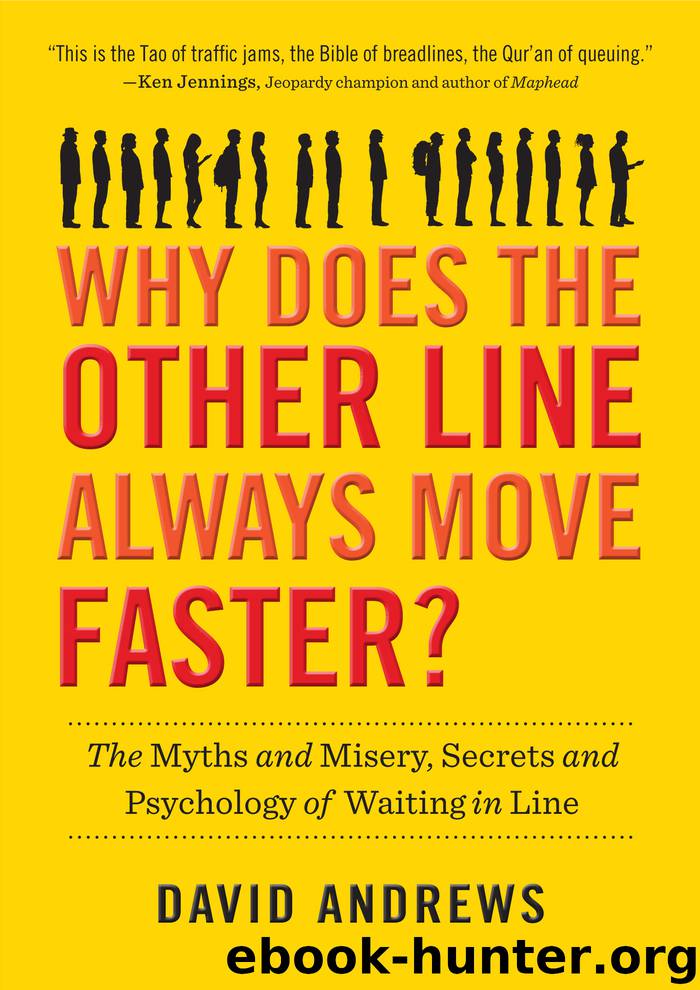Why Does the Other Line Always Move Faster? by David Andrews

Author:David Andrews
Language: eng
Format: epub
Publisher: Workman Publishing, Co., Inc.
Published: 2015-05-01T16:00:00+00:00
The Patriotic Queue
Our feelings about line standing change along with the political mood. For instance, in times of high patriotism—such as during wars with wide support—the queue might be seen as the embodiment of a collective, in which everyone should be treated equally and fairly. It reflects a spirit of “we’re all in this together.” As the French peasants reminded themselves, “Patriotism stands in queue,” steeling themselves to wait. (And wait. And wait.) The tedium is temporary; the war will one day end. Do your part. Get in line. Buy war bonds. Get your flu shots. Not long ago, I heard the historian Jean Ashton on NPR offhandedly characterize the 1950s as a time when Americans “stood in line.”
“People had just gone through World War Two,” she explained. “They were used to trusting the government. And they were used to being obedient. Some historians say the whole of the Second World War entailed people standing in line.” (Her implication being that we are much less willing to do so today.)
That same eagerness to get in line might be seen, by someone critical of patriotic fervor, as an example of conformity, anti-intellectualism, mindless fealty to authority. Such a critic might see the people in line as sheep, as consumers blindly following the actions and tastes of others.
Such was the view of the left-wing German social critic Walter Benjamin, for instance, who complained that “the mob, impelled by a frenetic hatred of the life of the mind, has found a sure way to annihilate it in the counting of heads. Given the slightest opportunity, they form ranks and advance into artillery barrages and department stores in marching order. No one sees further than the back before him, and each is proud to be thus exemplary for the eyes behind.”
Benjamin, a Jewish intellectual writing in a Germany that was ramping up for war—an atmosphere hostile to both Jews and intellectuals—might have had good reason to find this impulse to order troublesome.
Download
This site does not store any files on its server. We only index and link to content provided by other sites. Please contact the content providers to delete copyright contents if any and email us, we'll remove relevant links or contents immediately.
Hit Refresh by Satya Nadella(9115)
The Compound Effect by Darren Hardy(8917)
Change Your Questions, Change Your Life by Marilee Adams(7727)
Nudge - Improving Decisions about Health, Wealth, and Happiness by Thaler Sunstein(7687)
The Black Swan by Nassim Nicholas Taleb(7095)
Deep Work by Cal Newport(7053)
Rich Dad Poor Dad by Robert T. Kiyosaki(6588)
Daring Greatly by Brene Brown(6495)
Principles: Life and Work by Ray Dalio(6395)
Playing to Win_ How Strategy Really Works by A.G. Lafley & Roger L. Martin(6199)
Man-made Catastrophes and Risk Information Concealment by Dmitry Chernov & Didier Sornette(5993)
Digital Minimalism by Cal Newport;(5743)
Big Magic: Creative Living Beyond Fear by Elizabeth Gilbert(5735)
The Myth of the Strong Leader by Archie Brown(5488)
The Slight Edge by Jeff Olson(5402)
Discipline Equals Freedom by Jocko Willink(5368)
The Motivation Myth by Jeff Haden(5196)
The Laws of Human Nature by Robert Greene(5153)
Stone's Rules by Roger Stone(5072)
